In the lead-up to this month’s “Scene Showdown,” the question must be asked: ‘What, exactly, is a scene?’
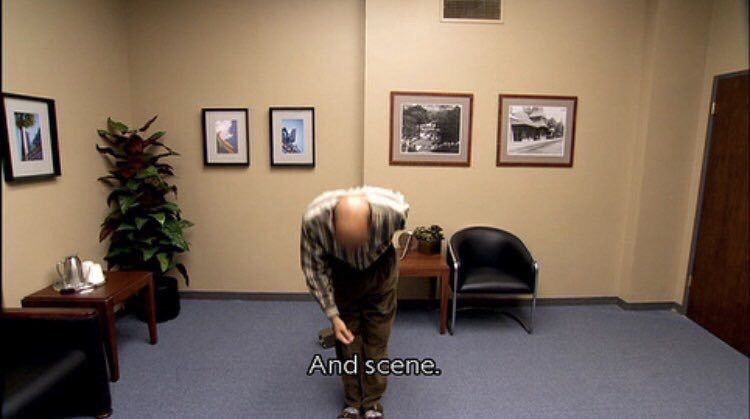
Before we break down what a scene is, here are the submission details for Scene Showdown. Literally EVERYBODY who reads this site should enter. Here’s what I need from you…
Title
Genre
Logline
Up to 50 words to prep the scene (up from 30)
A PDF of your scene (no minimum length, maximum is 5 pages long)
Send submission to: carsonreeves3@gmail.com
Deadline: 10pm Pacific Time, Thursday September 26th!
It’s funny because when I came up with the idea for Scene Showdown, I assumed it was self-explanatory. I thought that everybody knew what a scene was. But after all the questions that popped up in the comment section, I realized that a scene is not clear at all. So, let’s talk about what a scene is.
I started off by asking Chat GPT and I can’t say I’m a fan of his answer:
A scene is a distinct narrative unit where characters interact within a specific time and place to advance the story.
I then asked Miriam’s Dictionary for help and this is what they told me:
A division of an act presenting continuous action in one place.
I didn’t love that definition either so I googled a few other options:
A complete unit of storytelling, usually consisting of a sequence of events and dialogue taking place in a specific location and time.
A scene is a section where a character or characters engage in action or dialogue. You can think of a scene as a story with a beginning, middle, and an end.
Change (the writer of this article defines a scene as anything where a character expects one thing but something else happens)
Color me surprised that defining a scene is so difficult because, on a macro level, it seems obvious. Similar to how we inherently know what a paragraph is because we’ve read so many books, I figured we inherently knew what a scene was because we’ve watched so many movies.
But the more we get into the micro – nailing down the specifics of what makes a scene – the harder it becomes to define.
There are common threads in these definitions, however. Continuous time is one. A single location is another. There is action, dialogue, or both. Maybe the one thing that these definitions are missing is that there’s an actual point to the scenario. I like to think of it as a little story (which may align with the writer above who defines a scene as “change”).
With that in mind, our definition of a scene might look like this…
A storytelling unit where characters engage in action or dialogue within a single location during a continuous time frame.
Now, for those of you already getting wound up about the restrictions of that definition, calm down. This is a BASELINE definition to work with. It’s not the law.
If, for example, you write a scene where a married couple is fighting and they take the fight from their kitchen to their backyard, then to their car as they drive to work, that has three location changes but it’s still considered to be one scene because it’s continuous.
I think where writers get the most confused is with the time continuation thing. Because sometimes you’ll write three “scenes” that have time breaks between them, but they’re all so intricately woven together, you could make the argument that they’re one scene.
For example, let’s look at Kinds of Kindness, which I reviewed yesterday.
One of the scenes, from the middle story in Kinds of Kindness, has Robert, who’s mentally deteriorating rapidly in his marriage, coming to his wife, Rita, and asking her to chop off her finger, cook it, and include it in his dinner. This is, I guess, technically, one scene.
Right after that, we show Rita wrestling with whether to oblige her husband. She eventually decides to do what he says so she chops off and cooks her own finger. Again, this could be considered its own scene.
Finally, we have Rita serving Robert his dinner, with her finger, and him being confused as to why she would do this (remember, he’s going insane). That’s its own scene as well, you could say. But, really, all three of these moments, when combined together, make up about 5 minutes of screen time, and could, conceivably be pitched as one scene, even though there are time breaks between them.
Now some of you may say, “No, Carson. That’s a sequence (a “sequence” being a series of scenes).” And I wouldn’t say you’re wrong. But I think this speaks to why the question of “What is a scene” has perplexed so many of us. There is a greyness to the definition.
But what I hope this does for you, in regards to the showdown, is help you relax a little. As you can see, there’s some flexibility regarding what makes a scene.
I don’t want to stifle anybody’s creativity because some of the best writing I receive is from writers who have their own creative ideas and don’t try and retroactively engineer stories to my liking. BUT if I were you entering the showdown, I would be thinking in terms of a short story that fits within the constraints of our scene definition. Something that could, if not completely live on its own, is entertaining enough that we’d enjoy it without context. Get that clear beginning (setup), middle (conflict), and end (resolution), in there.
If you want to get more specific, use GSU. Have a character who wants something (goal), will gain much if he succeeds or lose much if he fails (stakes), and has a limited amount of time (urgency).
Some recent examples of mini-story scenes that have clear beginnings, middles, and ends, would be the scene in Furiosa when Dementus enters the Citadel and tries to convince the ruler, Immortan Joe, to hand the city over to him.
In The Killer, the Killer gets a taxi/uber ride with a specific cab driver and demands information on the person the driver gave a ride to three days ago who went to kill his wife. Simple beg, mid, end. Simple GSU.
In Parasite, the family who invades the home is surprised when the real family, who is supposed to be gone, comes back unexpectedly. They all must hide within the house and not be seen until the family goes to sleep and they can sneak away.
In Emily the Criminal, a good scene is when Emily is tasked with stealing her first car. She has to go into a dealership and buy the car with a fake credit card from the salesman. But she’s told that 8 minutes from the moment he swipes the card, she has to be out of there, or else the card company will call the salesman and tell him it’s a fake.
As you can see, all of these scenes feel important. They’re not just casual things going on between people. There are stakes involved. The moments are larger than life. That’s where you want your head when submitting for the Scene Showdown.
I hope that clears a lot of things up. But I noticed there were other questions in Tuesday’s post so let me answer the relevant ones here…
Does it have to be the first scene of your script? – No.
Can it come from a screenplay that hasn’t been written yet? – Yes
50 words to prep the scene – What I mean by this is, if the scene comes deep in your script, you can provide some context as to who the characters are and what was going on before the scene. This is not mandatory.
Logline and Title – As best you can, create a logline and title for the scene (not the script). I know it’s hard and you don’t have to be too specific (you can be mysterious if you want, i.e., “A young woman wakes up to find her dead child alive and well in her arms”).
Winner – Winner gets a deep dive review of the scene on the site and a collective kick in the behind to write the full script!
Is Kinds of Kindness genius-level writing?
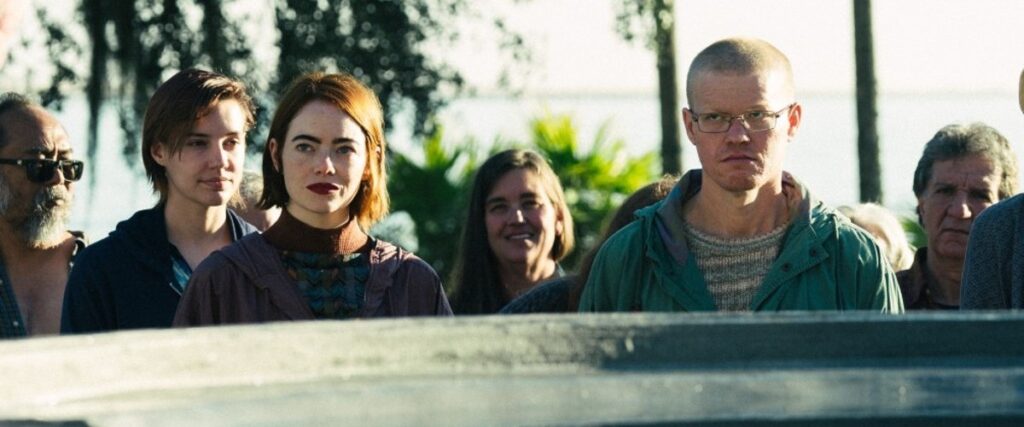
I want to pose a question to you.
It’s a simple question.
Here it is.
Have you seen Kinds of Kindness?
If not, why?
Maybe you can’t detect this but there’s a little aggression in the way that I’m posing the question because I see a lot of complaining in the movie space that movies don’t take risks anymore. They all play it safe. That’s why you don’t go to the movies as much.
Well, this movie does anything BUT play it safe. It’s about as risk-taking in the creativity department as a writer can get. So, why didn’t you see it?
You said you wanted stuff that’s different. This is different.
I have good news for you if you didn’t see it. I saw it for you. Mainly because it was free on Hulu.
The movie is definitely unique. It’s actually three separate 45 minute movies. With the same actors. Playing different roles in each one.
The first movie follows an executive named Robert who lives his life to please his boss, Raymond. Raymond controls every aspect of Robert’s life, from what he eats to when he has sex with his wife to what kinds of clothes he wears. But one day Raymond goes too far. He wants Robert to crash into another man’s car and kill him. Robert says no and Raymond deserts him. Robert then comes clean to his wife that the reason she can’t have children is because he’s been poisoning her coffee every morning (per Raymond’s instructions). So, of course, his wife leaves him. And now Raymond is desperate to get both her and Raymond back into his life.
The second movie follows Robert (who’s a completely different character now – a cop), who’s devastated that his wife, Rita, has gone missing. She was on a boat and the boat disappeared. But they find her on a deserted island. She comes back home and everything seems okay at first. But when she can’t fit her feet into her shoes, Robert suspects that she’s not his real wife. Robert then begins deteriorating mentally, going so far as to demand Rita cut off her finger and include it in his next dinner. Although a bargain basement police psychologist tries to help him get back on track, he keeps asking for more and more horrible things from Rita, until he goes too far.
The third movie follows Rita and Robert, who have fallen victim to a rich man’s cult. That cult is attempting to find a very special woman with supernatural abilities. So Rita and Robert are scouring the area trying to find this woman for their leader. But when Rita screws up and goes back to her former husband for a night, she’s deemed by the leader as “impure” and kicked out of the club. Rita now knows that her only way back in is if she finds the girl. So off she goes.

This is one of the more interesting explorations of screenwriting I’ve come across in a while because, usually, you can tell where a story is going. But when you take away most of the structure, you now have no idea where the story is going. And there’s something exciting about that. Cause for a good portion of the running times in all three movies, I struggled to guess what was going to happen next.
However, you can’t just write WHATEVER YOU WANT and expect it to work. When you’re going off-road, there are no more signs for your readers informing them they’ll be rewarded if they stay in the car. The way screenplays work is, like roads, they promise you things are coming up. This town is coming up in 30 miles. This other town is coming up in 70 miles. This big city is coming up in 120 miles.
Once you go off-road, there are no more towns or cities. You’re in the middle of freaking nowhere. So you have to find other ways to keep the reader turning the page. One of those ways is utilizing what I call the “Fallout Narrative.” The Fallout Narrative works like this. Something bad happens and then your hero struggles to adapt to it. That’s why we keep turning the pages. Because we want to see if he succeeds or fails in his adaptation.
So, in the first of the three movies here, the fallout is when Robert refuses to kill the other man in a crash. Raymond rejects him, leaving him without a job or a guide. Then his wife leaves him too. Robert is in major fallout mode. He has to try and get them back. In this particular scenario, the Fallout Narrative provides a couple of goals. Goal #1: Get Raymond to accept him again. Goal #2: Get his wife back.
When you have goals, you have active main characters. And an active main character will push the story along. If no one is trying to do anything, the story, by definition, cannot move.
The second of the three movies in Kinds of Kindness is also a Fallout Narrative. Rita comes back into her husband’s life. But her husband, Robert, is unconvinced that Rita *is* his real wife.
The storytelling mechanism behind why this works is a little more complex. Because the fallout to this one doesn’t create goals like the first one did. Instead, the fallout focuses on the deterioration of Robert. He becomes less and less convinced that Rita is his wife and the less convinced he becomes, the crazier he gets. There’s a wild scene where he and his cop partner stop a drunk driver and Robert shoots the passenger in the hand then runs over and starts trying to eat the blood from the wound.
If a character continues to change, whether it be in one direction (a good way) or the other (a bad way), we will keep turning the pages. It’s like approaching a car crash. We can’t wait to see just how bad the crash is. However, if Robert wasn’t getting worse, but rather staying the same, there would be no story here. Because there would be no fallout. It’s Robert’s deterioration that is the engine driving this middle story.
The third of the three movies is ALSO a fallout narrative, although it takes a little longer to get to the fallout. Rita and Robert are looking for this special girl. Rita goes back to her actual husband for a night. He rapes her. The leader now considers Rita impure. He kicks her out (this is the fallout) and now she’s desperately looking for this special woman so she can get back into the club.
What’s unique about the third story is that the first half is presented “in media res.” We’re dropped into this weird world where we don’t know who this cult guy is, what he’s talking about half the time, why Rita and Robert are testing a woman’s ability to raise the dead.
If you have enough odd things going on, that can definitely add an engine to your story until you move into a more traditional story engine. In the end, the name of the game is to keep the reader turning the pages. They will do that if you’re throwing weird stuff at them and they want to figure out what’s going on. Just don’t make them wait too long. If you keep piling weird onto weird onto weird, the reader eventually gets frustrated.
I would say that all three of these stories work, which goes to show that if you’re watching something artsy *AND IT WORKS* there’s a good chance that traditional storytelling mechanisms are in place. The writer is just better at camouflaging them.
When you watch weird/artsy stuff that sucks? It’s almost always because zero traditional storytelling mechanisms are being used. It’s just the writer trying to be weird for weird’s sake. That never works.
Even the story with the weakest plot engine here, the second one, technically has a goal driving the plot. Rita is trying to save her husband, who’s descending further and further into madness. But, to be clear, the reason why that’s the weakest story is because it has the weakest engine. Rita isn’t super-actively trying to save her husband, like Robert is trying to get his life back in the first story or Rita is trying to find the perfect girl in the third story.
That shows you that the IMPORTANCE of the goal to the hero (how much they want it) has a significant effect on how the reader takes in the story. The less your primary characters want something, the less your primary characters go after something, the slower the story will move and the more likely the reader will give up.
I do want to finish this article up by saying one thing. If you have three ideas, you have no ideas. There should always be a clear number one idea in your movie idea bag. If there isn’t, then you don’t have that idea worth writing yet. Kinds of Kindness is a “couldn’t make up my mind” movie: Throw three different shorts into the mix and call it a film. That’s a lazy move that rarely, if ever, pays off. You know how I know? Because nobody saw this movie.
You should’ve figured out which of these ideas was best and built a feature screenplay around that! They actually, all three of them, have the potential to be a feature film, with more development. To give us these tiny versions of all three stories feels like Yorgos gave up.
So, why did he do it? I would assume that Yorgos Lanthimos can get almost any actor he wants. With that said, the competition for the time of three of the most desired actors in Hollywood is immense. So, if you can offer them three roles for the price of one? That may be the deciding factor in picking you over [other hot director of the moment].
Which is another helpful reminder to write characters that actors can’t resist.
This movie WILL make my Top 10 of the year, no doubt. But it’s certainly not going to be for everyone. If you want to test your screenwriting mettle, however, I say check it out. It allows you to see how writing in non-traditional ways affects the viewing experience.
SINCE I HAVE NO IDEA IF THE NEWSLETTER IS GETTING TO PEOPLE, I’M JUST GOING TO INCLUDE IT HERE ON THE SITE. ENJOY! AND IF YOU WANT FUTURE NEWSLETTERS, E-MAIL ME AT CARSONREEVES1@GMAIL.COM. THAT’S ASSUMING I CAN GET THEM SENT OUT!

I was talking to an aspiring writer the other day and we got onto the topic of movies, specifically what we’d seen lately. He said that he’d rewatched this old movie that both of us liked and I said to him, “Have you ever read the script for that movie? It’s even better than the film.” What he said next shocked me. “I don’t read scripts.”
I gasped and replied, “What do you mean, you don’t read scripts? Like you don’t read them that often?” He said, no, he’d read maybe three scripts in his entire life and they were all classic film scripts. “You’ve never read a screenplay that hasn’t become a movie yet??” I asked. “No,” he said. “Never.”
This wasn’t the first time I’d heard this from a writer. In fact, I once knew a writer who didn’t just *not read* scripts, he was so uninterested in doing so, he’d go on 20-minute villain monologues about how pointless (and boring) reading scripts was. And he had proof to back it up! He actually sold a screenplay! For mid-to-six figures!

How the heck did that happen? Well, to his credit, he was really good at picking high concepts and injecting GSU (goal, stakes, urgency).
But there was always something off about his writing that I couldn’t put my finger on. The rhythm wasn’t quite there. The sentence structure was slightly odd. And just the whole experience of reading his scripts felt like you were reading a “highlights reel” of a script, ” if that makes sense. His scripts never felt like true screenplays.
Not that I wish any ill will on writers, but I wasn’t surprised to hear that the writer hung it up three years later, failing to experience any more success. You can sometimes get a lucky invite into the game. But it’s hard to stay if you don’t know what you’re doing. People figure that out sooner or later.
I have no doubt that the fact this writer had never read any screenplays before hurt his writing A LOT. Let me explain why.
I’m currently working with an actress who’s writing her first screenplay. It’s a true story about the birth of a particular tech industry. One of the issues she’s running up against is explaining the complicated world of that industry which is clear to her but foreign to us. So I sent her the Sam Bankman-Fried script I reviewed the other day, which did a lousy job of explaining its industry, in order to show her how the lack of properly conveyed exposition makes it hard for a reader to follow along.
It’s only when you experience writing weakness as a reader that it clicks for you what you have to demonstrate in your own scripts. How can you possibly understand how to keep someone interested in your story if you have never read a screenplay that’s kept your interest before? How can you ever understand how to keep someone from getting bored if you yourself have never been bored reading a screenplay before? How can you understand the rhythm of a screenplay if you’ve never been subjected to good screenplay rhythm? How can you know how much information the reader needs about your world if you’ve never read a script that effortlessly disseminates a lot of information?
You can’t just answer, “I can do that because I watch movies” because you’re not yet writing for a movie audience. You are writing for a reader. A series of readers must approve of your script before it can become a movie. So you have to be hip to THAT PERSON’S EXPERIENCE, not the audience member’s experience. And believe me, it’s a different ballgame. Movies are a passive experience. Reading is an ACTIVE experience. Or, to put it bluntly: Reading is harder than watching. So the bar for keeping the person engaged is higher.
I’m not saying you need to read as many scripts as I do. But you need to read at least a couple of scripts a month. Lucky for you, I have some reading material to pass on! I’m giving you four good scripts and two bad ones. You may be wondering why I’m including bad scripts. It’s because you need to know what types of things frustrate readers. You can’t write a good script unless you’ve been on the receiving end of a bad one. Because those are the scripts that drill into your head, “I’m going to make sure I never do that myself.”
Here are the scripts. Start your reading TODAY.
GOOD EXAMPLE #1
Title: After The Hunt
Logline: A Yale professor up for tenure must navigate a rape accusation from her most cherished student against another professor, who happens to be her best friend at the school.
Why I included it: This is considered to be the best script of the year so it’s definitely one you’ll want to check out.
GOOD EXAMPLE #2
Title: The Nowhere Game
Logline: Two young women are kidnapped, brought deep into the woods, given a head start, and then hunted down by their sadistic captor all for the pleasure of the online fans of “The Nowhere Game.”
Why I included it: This is a great example of how to write a script that reads quickly. Those tend to do well with readers because readers don’t have a lot of time.
GOOD EXAMPLE #3
Title: Dying for You
Logline: A low-level worker on a spaceship run by a dark god must steal the most powerful weapon in the universe to save his workplace crush.
Why I included it: This is one of my favorite scripts from last year. It’s really fun and effortless to read.
GOOD EXAMPLE #4
Title: Anaconda
Logline: A group of 40-something friends decide to remake their favorite film, Anaconda, in the real Amazon forest, only to learn that an actual giant Anaconda snake is out there.
Why I included it: I don’t love this script. But it’s a great example of how to come up with a fresh angle on an old property that the studios might get excited about if you pitched it to them. This film is being made with Paul Rudd and Jack Black. (More details on this project later)
BAD EXAMPLE #1
Title: Return to Sender
Logline: A woman who’s moved into a new home and is buying a lot of things from a giant delivery company learns that she is being used for a new delivery scam.
Why I included it: This script only got recognition because the writer directed a short that did okay. But the feature adaptation of that short is awful. Note how boring it is. Note how the story barely moves. Note how small the story feels. It’s an exercise in how easy it is to make it nearly impossible for the reader to turn the pages.
BAD EXAMPLE #2
Title: Star Blazers
Logline: A rag-tag group of space pirates come together to travel to a mysterious planet to retrieve a technology that will help them defeat the alien presence that has annihilated earth.
Why I included it: This is an old script that Hollywood never made. You can see that there’s not a single original idea in the script. It also takes waaaaay too long for the main plot to get started, a COMMON problem I see in screenplays, especially for newer scriptwriters.
It’s fine if you dislike any of the scripts I recommended here or like the ones I didn’t. The objective isn’t to have you mirror my taste. It’s to help you develop your own. Regardless of which side of the fence you end up on, take note of *WHY* you like something or *WHY* you don’t. That way, you can apply (or not apply) that same approach to your own material.
NOW TAKING SUBMISSIONS FOR “SEPTEMBER SCENE SHOWDOWN!”
This month’s showdown is a SCENE SHOWDOWN. I enjoyed the process of posting the first five pages of the Mega-Showdown finalists. So I thought I’d capitalize on that theme this month. Hence, we’re going to have a SCENE SHOWDOWN. Your scenes can be five full pages long and not a word more. Write the best scene possible, submit it to me, and I will post the best five entries on the site. Another reason I’m doing this is so as many of you can enter as possible. You can write a scene in a single day. So take advantage of this. Help me discover a writer who’s ready to blow up!
For the submission, it’s going to be a little tricky, cause it’s hard to write a title or a logline for a single scene. But the good news is, I’m going to read every scene that’s submitted. And I’ll be choosing on strength-of-scene rather than the title or logline. So do your best. Also, I’m going to give everyone 30 words to prep the scene if they want to. So, here are the submission details:
Title
Genre
Logline
Up to 30 words to prep the scene
PDF of scene (up to 5 pages long)
Send to: carsonreeves3@gmail.com
Deadline for entries is 10pm Pacific Time, Thursday September 26th!
AROUND TOWN

Mega-Showdown Winner, “Bedford” – The Scriptshadow Mega-Showdown winning script won me over just as it did the readers. It is a taut contained thriller in the vein of The Vast of Night. But it stirred quite a bit of controversy in the comments, with a lot of readers claiming it’s more of a stage-play than a film, since the majority of it takes place in one room and focuses on a single character. If the script were to be filmed, they argued, it would be boring because there’s nothing cinematic about it. It’s the age-old dilemma every aspiring screenwriter faces. The best way to get the most interest is to write something contained and low-budget. However, by doing so, you risk writing something static and boring. I, personally, think you could make a cool movie out of Bedford. Keep the camera moving when possible. Maybe get the hero out of the control tower a couple of times so that the location doesn’t get too stale. It was fun to see all the responses to the script. We haven’t had that spirited of a discussion about a screenplay in a long time. You can read the script for yourself here then head over and read my review!
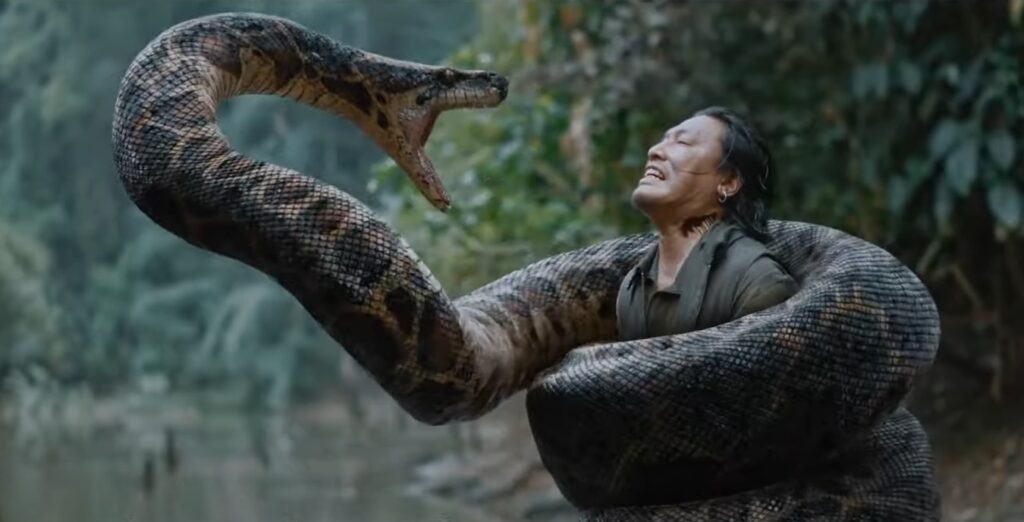 Weird Anaconda Reimagining Somehow Going Forward at Sony – When I read this Anaconda reboot script, I thought it was a fun experiment but, by no means did I think they were going to make it. It was too weird – like something a couple of stoner college kids would write in between parties on Spring Break. But guess what? Sony’s actually going through with it! They’re signing Jack Black and Paul Rudd to play the leads, which certainly makes the project more enticing. For those who don’t know, the new Anaconda movie is going to follow a group of former aspiring filmmakers who loved the original Anaconda so much, they head to the jungle to film a low-budget version of the film in the hopes of selling it to Sony. Except they quickly learn that the giant anaconda snake is real! And it’s after them! Sony is obviously trying to do what they did with the Jumanji franchise. They took a sort-of popular movie from the past and reimagined it as a video game. So there’s some logic to the offbeat approach. But I’m just telling you – the script was really sloppy. It literally feels like the characters are making things up as they go along. If this movie is going to work, they will need to massively tighten up the story. Cause it’s a loosey-goosey premise as it is. When you add a casual narrative to a loosey-goosey premise, it has the potential to become a “What the fuck did I just watch” movie.
Weird Anaconda Reimagining Somehow Going Forward at Sony – When I read this Anaconda reboot script, I thought it was a fun experiment but, by no means did I think they were going to make it. It was too weird – like something a couple of stoner college kids would write in between parties on Spring Break. But guess what? Sony’s actually going through with it! They’re signing Jack Black and Paul Rudd to play the leads, which certainly makes the project more enticing. For those who don’t know, the new Anaconda movie is going to follow a group of former aspiring filmmakers who loved the original Anaconda so much, they head to the jungle to film a low-budget version of the film in the hopes of selling it to Sony. Except they quickly learn that the giant anaconda snake is real! And it’s after them! Sony is obviously trying to do what they did with the Jumanji franchise. They took a sort-of popular movie from the past and reimagined it as a video game. So there’s some logic to the offbeat approach. But I’m just telling you – the script was really sloppy. It literally feels like the characters are making things up as they go along. If this movie is going to work, they will need to massively tighten up the story. Cause it’s a loosey-goosey premise as it is. When you add a casual narrative to a loosey-goosey premise, it has the potential to become a “What the fuck did I just watch” movie.
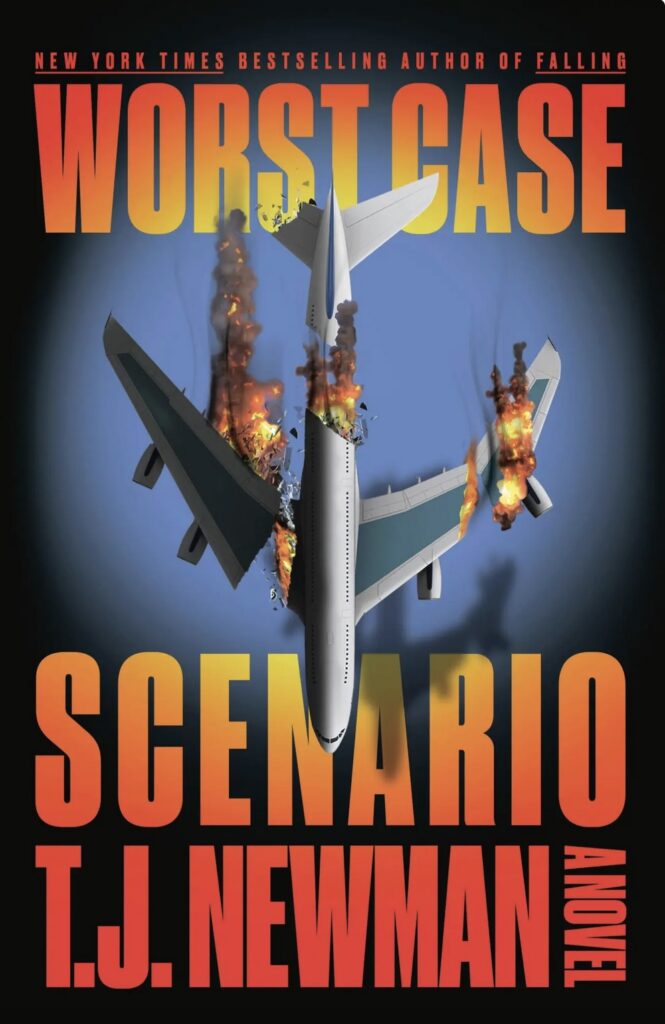
Worst Case Scenario – TJ Newman is back with her third big thriller book. For those who don’t know Newman’s journey, she’s the flight attendant who wrote a book in between serving passengers on transatlantic flights. She then sent her first book, Falling, to 40+ agents, all of whom rejected her. Until finally she landed one, which helped her secure a million dollar movie deal for the book. What I like about TJ is that she writes these high concept ideas as fast-moving thrillers. In that way, they mimic screenplays. This allows for quick and dirty reads that present the core concept in a digestible way. In other words, they’re easy for a producer to say ‘yes’ to. Newman said this idea – a plane crashing into a nuclear reactor – came to her because, in a search for story ideas, she asked all the pilots she knew what their biggest fear was. One of them said, that a terrorist not only hijacked their flight, but flew the plane into a nuclear reactor. Pro tip: Be ready for success like TJ Newman was. She wrote her second novel QUICKLY and, therefore, was able to take advantage of the buzz surrounding her first sale, grabbing a second flashy movie deal with “Drowning.” And she wrote this third book pretty fast as well. If you wait too long and a movie falls apart before production or the movie gets made and it sucks, you lose all that buzz, which makes it much harder to sell stuff. But if you can write more books and scripts BEFORE any of that happens, you can really cash in. That’s what Newman did.
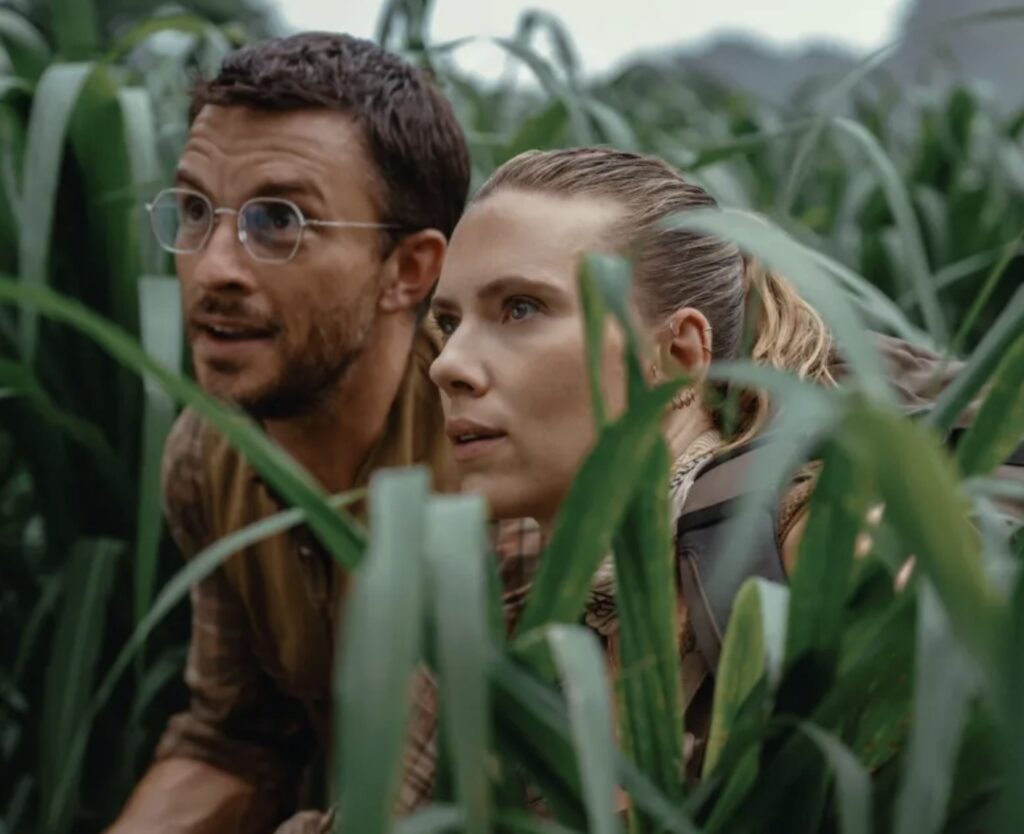
Jurassic World Rebirth – Things have gotten so competitive in the content space that studios aren’t even waiting the minimum amount of time to reboot franchises anymore (that would be 5 years). They’re now trying to do it in 3 years! The last Jurassic World movie came out in 2022. This new one, starring Scarlett Johanssen, will come out in 2025 (funny enough, the setting for the new story will take place 5 years after the previous film). Here’s the premise: The three biggest dinosaurs have a genetic secret that will help save a bunch of human lives. So Scarlett must travel across the world and get DNA samples from these three rogue dinosaurs. But, in the process, she gets stuck on an island with them. Let’s be honest – it’s an uninspired, borderline clumsy, premise. You would think that if they were rushing to get this made, they’d have something sexier. But this feels like par for the course. It is interesting to note how Anaconda is rebooting itself in a risky way whereas Jurassic World is taking zero creative risks. There is a mystery as to what is on the island in this movie. It could be the long-rumored “Dino-humans” that found their way into earlier Jurassic Park sequel drafts. But I don’t think Dino-humans are going to cut it for audiences. This feels like a cash-grab and the stench of that greed is so thick, I’m anticipating nobody showing up for dinner.
Don’t Forget to Grab The Greatest Dialogue Book Ever Written!
This Labor Day, it’s time to finally improve your dialogue. I keep running into amateur scripts with weak or average dialogue. My dialogue book gives you specific instructions on how to add more flavor to your characters’ interactions. It’s just $9.99 and has over 250 dialogue tips in it. That’s 240 more than anybody else is going to give you. What are you waiting for!?
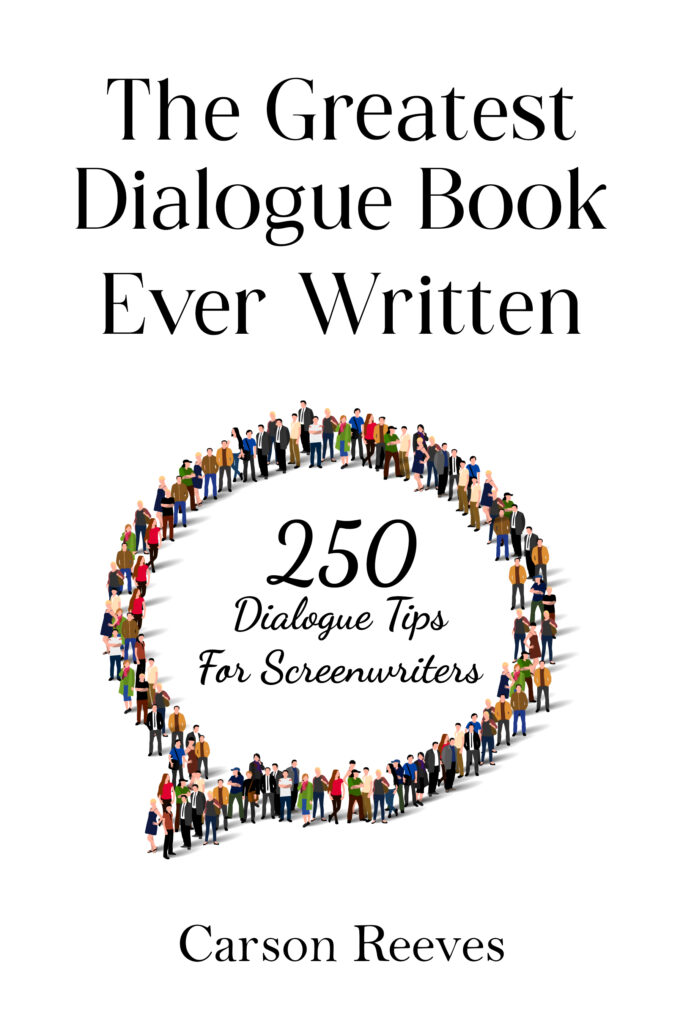
Book Review – Caught Stealing
Genre: Crime/Thriller
Premise: A baseball-loving lowlife agrees to cat-sit for his neighbor, inadvertently getting pulled into the seedy underworld of New York crime, where people will do anything to get the money they deserve.
About: This is uber-auteur Darren Aaronfsky’s (The Whale, Requiem for a Dream) latest project. It has a flashy cast list that includes “Elvis,” wannabe Oscar-winner Austin Butler, House of The Dragon’s Matt Smith, and borderline Hollywood royalty, Liev Schrieber. The writer, Charlie Huston, has written six books and tons of comics.
Writer: Charlie Huston
Details: about 250 pages

It’s always interesting to see which projects great directors, actors, and producers choose, as it’s a window into their decision-making process and, therefore, knowledge you can use if you ever get an opportunity to pitch them yourself.
But, with this one, there isn’t a lot of guesswork as to why Aronofsky chose it. His previous movie was all about a man glued to his chair (The Whale). This movie is all about a man who never stops moving. Whether Aronofsky was conscious of that radical shift or not, he obviously wanted to go in the opposite direction of “guy on chair.”
New York City. Hank is a professional drunk. He used to have a future as a major baseball prospect but nowadays, in his 30s, his only proximity to baseball is betting on it. After a particularly gnarly night of drinking, Hank is asked by his apartment neighbor, Russ, to take care of his cat while he’s gone. Hank thinks nothing of it and agrees.
The next day, after he feeds the cat, he moves the cat litter box and finds a key taped to the bottom of it. Hank shrugs and heads out to drink again. When he gets back, some Russian guys want to talk to him. They explain that they’re looking for his neighbor, Russ, and they really REALLY need to find him. Hank tells them the truth – he doesn’t know where his neighbor is or when he’ll be back – and they begrudgingly leave.
But the next day, the Russians come back, and this time they’re a lot less kind. They know Hank knows where Russ is as well as where the key is. Then they beat him up badly to let him know how much they need that key. Hank says fuck this and calls the cops. A policeman named Roman comes over. Asks him a bunch of questions. Roman says be more careful. And leaves.
The day after that, two large black men in cowboy attire show up and THEY want to know where the key is. They drive him around and rough him up in order to let him know how much they need that key. As soon as they’re gone, the Russians come back to beat Hank up some more. But this time, they bring Roman with them. Yes, Roman the Cop is working with the Russians.
Fun and games are over. If Hank doesn’t give them the key, they’re going to kill him. Okay fine, Hank says. I’ll get you the key. There’s only one problem – Hank hid the key when he was blackout drunk. So he doesn’t remember where it is. His best guess is at the bar he always hangs out at. But telling Roman that is a big mistake. They all head there and Roman’s men mow down everyone at the bar when they don’t offer up access to the key. This makes Hank the most wanted man in New York.
Just when things can’t get any weirder, Russ returns, finally providing clarity to the key’s importance. That key is for a storage unit that contains 4.5 million dollars. Hank will have to figure out how to push Russ out of this equation, get the money back to the bad guys so they’ll leave him alone, and oh yeah, get the cat back from Roman. Spoiler alert. IT’S NOT GOING TO BE EASY!
The one thing I’ll give Caught Stealing is that, once you read it, it’s impossible to get it out of your head.
It’s one of the most raw, visceral, intense, violent, things I’ve ever read. And it isn’t just the 50,000 punches thrown that you feel. It’s the limitless amount of alcohol being poured down our hero’s throat. It’s the devil-like screaming at Hank from every character he encounters. Even the anguish in this book feels like physical punishment.
But the story has a pretty glaring weakness. And while I believe that Aronofsky is the director best suited to tackle this weakness, I’m not convinced he can overcome it. That weakness is that the story is led by one of the most passive characters I’ve ever come across.
60% of this story is Henry getting his ass handed to him. He’s a punching bag. Again. And again. And again. And again. And again.
I suspect that’s the point. There’s some sado-masochist thing going on with Aronofsky where he wants to show someone get relentlessly beat up for 2 hours. I just don’t know if audiences are going to be able to handle it. Cause it’s so uncomfortably relentless!
But the passivity really bothered me. I’m trying to think of movies that have attempted this before. There was Equalizer 3. Denzel’s character sat back and waited most of the movie. But that was a unique situation in that we knew, from his two previous films, what he was capable of and that it was only a matter of time before he beat some ass.
And then there was Fury Road, where Mad Max gets thrown on the front of a truck for the first 45 minutes and doesn’t do anything. But he eventually got out and began kicking ass.
While it’s true that, once the midpoint hits, Hank starts becoming more active, I’m not sure it made up for the first half of the movie where the dude was just thrown around like a rag doll for an hour. I want you to imagine watching a friend of yours get beat up for 2 straight minutes. How painful would that be to watch? NOW MULTIPLY THAT BY 30! That’s what we see Hank go through.
I will say that we’re all looking to give audiences something fresh – something they haven’t seen already. One of the best places to do that is in your set pieces. If you can come up with three memorable set pieces, you’ve probably written a really good movie. And while there’s nothing outwardly original about the set pieces here, the sheer magnitude of violence on display acts as its own set piece. It’s very much “Resevoir Dogs ear-cut-off scene.” But imagine after that scene was over, you got another ear-cut-off scene, and another one, and another one. At what point, as a viewer, do you surrender!??
In that sense, Caught Stealing makes me think of early Quentin Tarantino with a healthy dose of Fight Club mixed in. I mean the budget for this film is going to see a quarter of it spent just on the Foley artists crafting the thirty-some variations of the sounds of skulls cracking.
Just like all of Aronofsky’s movies, when you see the trailer, it’s going to be different. You will note how you have not seen a movie like this before. Even Fight Club and Reservoir Dogs are not as violent as this film. So it’s going to stand out. But will that lead to people wanting to see the movie? I don’t know, man. It’s a tough call. I’m emotionally spent just reading it. I can only imagine the toll it will take on me watching it.
[ ] What the hell did I just read?
[ ] wasn’t for me
[x] worth the read
[ ] impressive
[ ] genius
What I learned: We talk a lot about the midpoint shift in a story. It’s the thing you use to create a different SECOND HALF of the movie that doesn’t feel like the first half. Here, we have a very prominent midpoint shift. Russ (the neighbor), the one who’s responsible for all this, returns. So, whereas, before we had zero knowledge of what was going on, Russ’s entrance allows us to have ALL THE KNOWLEDGE. This changes everything for our hero and how he approaches the problem.

When you read that title, you’re probably thinking, “That sounds kind of clickbaity, Carson.” I agree. It does sound clickbaity. But, actually, the message in that title is the key to saving Hollywood. No, I’m serious.
I am speaking to producers with this article. I am speaking to studios. I am speaking to streamers. I am speaking to agents. If you want to bring good screenwriting back to this town, you need to start spending 7 figures on scripts again. And, just as importantly, you need to publicize it. As in, START CONTACTING THE TRADES AGAIN AND PUBLICIZE YOUR SALES! Let me explain why.
The other day, I saw an article announcing that someone was trying to put together a Pacific Rim prequel series.
Let me repeat that: Someone is trying to make a Pacific Rim TV show.
Pacific Rim was one of the dumbest movies I’ve ever seen. It had the intelligence quotient of Transformers and the filmmaking ability of Taylor Swift: The Eras Tour.
The fact that Hollywood is now trying to make a TV series out of this bottom feeder IP shows that they have nothing left to make. They’ve scoured through every single IP in their basements, from both the television and feature side, and, since most of those shows bombed, they don’t have anything left!
How did this happen?
It happened because there aren’t anywhere near enough talented screenwriters in town to support the amount of product being made. There are 750 scripted TV shows out there at the moment with an average of 12 episodes per season. That’s roughly 9000 episodes being written every year. The industry does not have 9000 good screenwriters.
My rough estimate is that there are about 5 great writers in the industry, i.e. someone who can write a Succession.
There are 15 or so really good writers, people capable of writing a Ted Lasso.
And there are 40-50 good writers, people who can write a Silo.
From there, there are a ton of average and, even, bad writers. People who write stuff like Secret Invasion.
That total number of good-to-great screenwriters in town equals about 1/10 of how many shows are getting made. Which means 90% of the TV shows out there are garbage.
And it doesn’t take long to figure that out on your own. How many times have you watched a pilot and thought, “This is pretty good.” You then watch the second episode and think, “This is okay.” And then you watch the third episode and notice that the show is falling apart right before your eyes. If a show manages to get me past the pilot – which is rare – that cycle happens almost every time.
Why?
Because the creator of the show obviously spends a lot of time on the pilot script, making it perfect. They then spend less time on the second episode, which is why it’s only okay. And then the third episode is usually the first time a staff writer comes in and writes an episode.
I just watched this happen on The Acolyte. When Headland was writing the first two episodes, they were, at least, decent. But the second they brought in a staff writer with virtually no writing experience to pen the third episode, the show completely fell apart. And this is for a 180 million dollar show! We’re giving below-average screenwriters with zero experience 25 million dollar episodes! Which is insane!
What does this all mean?
A couple of things. Number 1, we’ve got way more shows than we have writers with the ability to write those shows. Number 2, we have a weak overall pool of writers in town. I would say way weaker than we’ve ever had.
The reason for this is, everybody gets a bite at the apple now, even if they don’t deserve it. In the previous era, you had to scratch and claw and fight just to find the seed that would allow you to grow the apple tree, that would then take years to grow big enough to give you an apple that you could then bite into. The competition and the dedication required to get in the game were way more extensive and, as a result, only rewarded those who were willing to put in years of work.
So I gave some thought to why that was. Why are we giving shots to bad writers?
Simple. We don’t have a choice. There aren’t enough ones.
Let’s face it, screenwriting isn’t nearly as cool today as it was 30, or even 20, years ago. I can’t remember the last time I read an article about some cool new screenwriter who wrote a great script. These days, articles focus on the hot new podcaster or the hot new influencer. These are the people who are getting press in this industry. Not screenwriters.
Well, why is that?
The answer can be found by asking when did Hollywood get the biggest influx of screenwriters? It was in the 90s. Why? Because every freaking week the trade magazines were reporting a million dollar script sale. What does that do to people reading those articles? It makes them want to become screenwriters!
I don’t think Hollywood ever intended for it to do so. But all those stories were de facto advertisements to become a screenwriter. They had inadvertently infused the Hollywood pool with an endless supply of writers. If you take away the advertisements, you don’t get the aspiring screenwriters anymore.
There’s a lot of talk in town about the movie business declining. About the golden era of TV being in the past. The reasons they give are that there’s more choice out there (podcast, YouTube, internet, etc). But I don’t buy that. Movies and TV are great because they’re such passive watching experiences. Which means they don’t require a lot from the viewer. It doesn’t take much to turn on your TV.
The real problem – the one the studios don’t want to admit to themselves – is that they’re giving people a subpar product. And guess what? It ain’t because of the directing. It ain’t because of the production value. The production value of TV and movies has SHOT UP EXPONENTIALLY in the past 20 years. What does that leave?
THE WRITING.
It’s the writing that’s the problem.
Good writing HOOKS PEOPLE and KEEPS THEM HOOKED.
Very few writers working in the industry have enough experience to have learned the tools that allow them to do this.
If you want better writing, you gotta advertise to those potential aspiring writers out there in Iowa and Florida and Illinois. I’m telling you – if you start publicizing stories about people making a million dollars from selling scripts again? You will get a whole new wave of people racing to Hollywood to write scripts. I don’t care if they’re doing this on the feature side or the TV pilot side but they need to do it! They need to do it if they want to survive.
Cause the more poorly written shows and poorly written movies they give us, the less we’re going to want to watch the next movie or show.
Okay, so what does this mean for you! For the writer who’s been writing for a long time and still hasn’t had their big break?
It’s AMAZING NEWS for you.
It used to be that, if you spent 10 years trying to become a screenwriter and you hadn’t made a dent, you were washed up. That’s no longer the case AT ALL. Now, you actually know how to write! All these people they’re putting on these Star Wars and Marvel shows? They don’t know how to write! You’re better than them!
But the industry isn’t going to come to you. If there’s one thing these bad writers have over you it’s that they’re hitting the ground harder. They’re putting themselves out there more, either through social media or directing their own scripts or just good old fashioned hustle. Studios choose these people because these are the people standing in front of them. You need to put on some nice clothes and stand in front of *those people* if you want a shot.
Cause the industry doesn’t know you. Or know you’re better. You have to advertise yourself for them to know. So, blanket every outlet online with your best scripts until you get that yes. Again, people don’t say “yes” often. So, if you get 10 no’s, that doesn’t necessarily mean you’re screwed. What did TJ Newman, the writer of the book Falling (essentially a book-screenplay) say? That she got rejected 44 times in a row before she got that yes?
You have to fight and promote a lot harder than you think you do.
And please do!
Cause I want to have a freaking good TV show to watch!
There will be no post on Monday, as it’s Labor Day here in the U.S. But I will be sending out the newsletter over the weekend, which includes a review of a buzzy new project from one of the industry’s best directors. If you’re not already on the newsletter list, e-mail me: carsonreeves1@gmail.com
Today’s script reminds us of the power of the underdog
Genre: Comedy/Drama/Sports
Premise: A forty-three-year-old snowplow driver decides to get his high school hockey team back together to play a state championship game.
About: Today’s writer may be familiar to some. He’s a Chicago kid who wrote the script 8-Bit Christmas a few years. It was a fun little Christmas script and Kevin stays close to his bread-and-butter here: SNOW. Skydance has purchased the script for Gary Ross to rewrite and direct.
Writer: Kevin Jakubowski
Details: 111 pages
 Jason Sudekis for Tommy?
Jason Sudekis for Tommy?
This script is currently competing with Carlos Alcaraz’s match on my TV. Has a screenplay ever hit a 130mph serve? Is courier font able to handle a deep backhand? Can character development massage a drop volley over the net? We’re about to find out the answers to all of these questions… right now.
Back in 1997, Tommy Maloney was the goalie for the Fox River High School hockey team that made it to the state championship game, where they were slated to play bougie Jersey hockey mainstay, Hillstone Prep. But there was a giant snowstorm and the game had to be canceled.
Roughly 30 years later, with Tommy now 43 years old and running his father’s old snowplow business, Tommy reads an article in the paper celebrating the three state hockey championships Hillstone won in a row back in the 90s. The only problem is, Hillstone didn’t win that third one. The game was snowed out.
A day later, while reluctantly bringing his daughter, Chloe, to Hillstone for an interview, he runs into the captain of that team, JT Radzack, who he overhears telling some friends that they won 3 titles in a row. Tommy comes in to correct him and JT is unfazed. “Might as well be three,” he says. “We would’ve beaten you anyway.”
Tommy goes home fuming and later ends up at the bar, where he shares the exchange with his old hockey buddies. They get mad and one of them goes on Twitter and challenges JT and his team to a make-up game. A 30 year old make-up game. Twitter loves it and everyone starts retweeting the social media battle that ensues. Tommy wakes up thinking it was all drunken nonsense but then learns that JD has set a date for the game.
Now Tommy and his buddies have to get the band back together. This includes the Chan defensive twins, who fight with each other all the time. The cousins, who sit in their backyard and shoot things all day. And then everyone else who’s not dead already, they put in a call in for. They’re going to be up against a tough opponent since JD and his teammates still play three times a week. JD even played in the NHL for a year. Can our ragtag crew somehow defeat them? Or are they about to learn that hockey games aren’t the best venues for a midlife crisis?
There’s a trick to getting these scripts right.
Because they *are* tricky.
You see, when you’re writing a small-town story that doesn’t have murder in it, the script is going to live or die on its PERSONAL STAKES.
Personal stakes are different from EXTERNAL STAKES. External stakes are things like: end of the world, your daughter gets murdered if you don’t find her in time, if the heist goes bad, you’ll be in prison for the rest of your life.
Scripts like this don’t have that. In order to compete with that, we must feel strongly about the personal stakes. In other words, we must feel strongly about Tommy winning this game. Because if we don’t care about that, the script doesn’t work.
And the writer does a good job of handling that with some basic screenwriting tools. One, he makes the bad guys huge jerks. They’re elitist. They look down on Tommy and his team. They make his, and his family, out to be failures. The more we dislike the bad guys, the more personally invested we become in the story.
The other way the writer does it is by having Tommy face the disappointment of his life. He plows snow for a living. He always thought he was going to be something bigger but somehow ended up in this crappy existence. That’s highlighted, very cleverly, by the fact that his daughter wants to go to Hillstone, the very school that symbolizes who he isn’t. People who go to Hillstone lead successful lives.
It’s important to get that right. Cause when you’re only dealing with personal stakes, you can’t casually commit to your hero’s flaws. You have to fully commit to them. When we’re with our protagonist, we have to *feel* their pain. Cause if you treat their flaw like an Adam Sandler movie would – a passing funny scene in the first act that shows they’re frustrated with life – it’s not going to linger deep inside the reader. And, therefore, your personal stakes-driven story will fail.
I always want to give credit to scripts for the scene that drew me in. You’re reading along. You’re half-interested. You’re not sure if you’re going to like the script. And then a scene comes along that makes you go, “How bout that. I care now.”
What never fails to surprise me is that these scenes are usually basic, as was the case here. Tommy is taking his daughter to Hillstone for her big school interview. While waiting for her in the school’s entrance hall, a group of good-looking well-off dudes his age are taking a picture in front of the trophy case.
It turns out these are the guys from the Hillstone hockey team that Tommy’s team never played. Because Tommy is kind of in the way, one of them says, “Hey, you mind stepping aside for a second? Trying to get a photo of our hall of famers here.” Tommy moves aside. “You mind moving your bucket too.” He points to a janitor’s mop and bucket nearby. “That’s not mine,” Tommy said. “Well, I don’t care if it’s your’s or a coworker’s, just move it.”
That moment, right there, made me hate these guys. And now I wanted Tommy and his team to defeat them at all costs. Isn’t it funny how one simple moment can create such emotion within the reader?
It takes courage to write a script like this because, let’s be honest, these types of scripts aren’t in favor these days. This is the kind of movie that you could imagine getting made in 2001. But they don’t greenlight stuff like this anymore. With that said, I’m constantly telling you guys to write AGAINST the grain, not with it. Because, if you do so, you’re going to stand out from the pack. That’s what Jakubowski did and guess what? Someone bought the script.
[ ] What the hell did I just read?
[ ] wasn’t for me
[x] worth the read
[ ] impressive
[ ] genius
What I learned: The underdog storyline is about as good of an “invested reader” guarantee as you can get, especially in sports scripts. But today’s script taught me that you can supercharge the underdog storyline by making it a “rich vs. poor” battle. The fact that the villains are rich and elitists makes us want Tommy and crew to beat them so much worse!
What I learned 2: You need set pieces before the final game! In a script like this, you can’t wait until the final act to give the reader fun hockey play. And no, montages of them practicing don’t count. You need at least one fun hockey set piece because that’s why we’re here. We’re here to watch these guys play hockey. So Jakubowski wisely includes a fun scene in the latter part of the second act where they play a scrimmage against a local top-tier 16 year old girls hockey team. It’s a really funny sequence.

